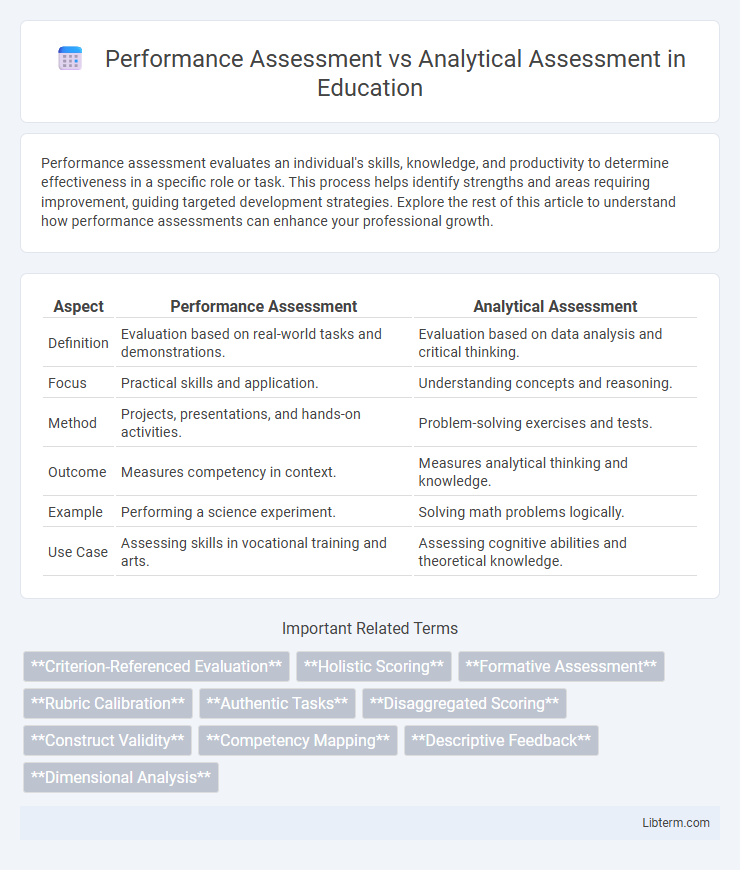Performance assessment evaluates an individual's skills, knowledge, and productivity to determine effectiveness in a specific role or task. This process helps identify strengths and areas requiring improvement, guiding targeted development strategies. Explore the rest of this article to understand how performance assessments can enhance your professional growth.
Table of Comparison
| Aspect | Performance Assessment | Analytical Assessment |
|---|---|---|
| Definition | Evaluation based on real-world tasks and demonstrations. | Evaluation based on data analysis and critical thinking. |
| Focus | Practical skills and application. | Understanding concepts and reasoning. |
| Method | Projects, presentations, and hands-on activities. | Problem-solving exercises and tests. |
| Outcome | Measures competency in context. | Measures analytical thinking and knowledge. |
| Example | Performing a science experiment. | Solving math problems logically. |
| Use Case | Assessing skills in vocational training and arts. | Assessing cognitive abilities and theoretical knowledge. |
Introduction to Performance and Analytical Assessment
Performance assessment measures an individual's ability to apply skills and knowledge in real-world or simulated tasks, emphasizing practical execution and problem-solving. Analytical assessment evaluates critical thinking, reasoning, and data interpretation through structured questions, focusing on logic and understanding rather than hands-on skills. Both assessments complement each other by providing a comprehensive evaluation of knowledge application and cognitive abilities.
Defining Performance Assessment
Performance assessment evaluates a learner's ability to apply skills and knowledge in real-world or simulated tasks, emphasizing practical execution over theoretical understanding. It measures competencies through activities such as presentations, projects, or hands-on experiments, providing tangible evidence of skill proficiency. This form of assessment prioritizes authentic performance outcomes, often using rubrics to ensure objective evaluation.
Understanding Analytical Assessment
Analytical assessment involves breaking down complex problems into smaller components to evaluate each element's effectiveness and accuracy, often using data-driven methods and diagnostic tools. This type of assessment helps identify specific skills gaps and cognitive processes, providing detailed insights for targeted interventions and improvement strategies. Unlike performance assessment, which measures the overall ability to complete tasks, analytical assessment focuses on the underlying mechanisms and reasoning behind task execution.
Key Differences Between Performance and Analytical Assessment
Performance assessment evaluates a learner's ability to apply skills and knowledge in practical, real-world tasks, emphasizing demonstration and execution. Analytical assessment focuses on breaking down information into components for critical thinking, reasoning, and understanding underlying concepts. Key differences include the nature of evaluation--practical application versus cognitive analysis--and the type of skills measured, with performance assessments targeting applied skills and analytical assessments measuring problem-solving and analytical reasoning.
Criteria for Selecting Assessment Methods
Performance assessment criteria prioritize real-world task execution, measuring practical skills, problem-solving abilities, and the ability to apply knowledge in authentic contexts. Analytical assessment criteria emphasize systematic evaluation, focusing on the accuracy, logic, and reasoning processes behind responses, often using quantitative or qualitative data analysis. Selecting assessment methods depends on learning objectives, whether the goal is to assess applied competencies or cognitive understanding.
Advantages of Performance Assessment
Performance assessment offers a practical evaluation of skills by requiring individuals to demonstrate tasks in real-world contexts, providing a more accurate measure of competence compared to analytical assessment's focus on theoretical understanding. It enhances critical thinking and problem-solving by engaging learners in active application rather than rote memorization. This method fosters deeper learning and better retention by simulating authentic challenges encountered in professional environments.
Benefits of Analytical Assessment
Analytical assessment enhances decision-making by providing in-depth insights through data-driven evaluation, enabling precise identification of strengths and weaknesses. This method supports predictive analysis, helping organizations anticipate future trends and improve strategic planning. It also facilitates continuous improvement by systematically tracking performance metrics and uncovering root causes of issues.
Challenges and Limitations of Each Assessment Type
Performance assessment challenges include subjective scoring and variability in evaluator judgment, which can impact reliability. Analytical assessment faces limitations in capturing complex skill application as it breaks down tasks into discrete components, potentially overlooking holistic performance. Both assessment types require careful design to balance accuracy, consistency, and validity in measuring learner outcomes.
Practical Applications in Education and Industry
Performance assessment evaluates learners or employees based on real-world tasks, enhancing skills like problem-solving and critical thinking in education and industry training. Analytical assessment breaks down complex knowledge into components, enabling detailed understanding and targeted feedback, essential for academic testing and data-driven industry evaluations. Combining both approaches maximizes practical skill development and theoretical comprehension, improving overall competency and productivity.
Choosing the Right Assessment for Your Needs
Performance assessment evaluates practical skills by requiring individuals to complete real-world tasks, ideal for contexts demanding hands-on expertise and applied knowledge. Analytical assessment measures critical thinking and problem-solving abilities through structured questions or scenarios, best suited for situations emphasizing cognitive understanding and reasoning. Selecting the right assessment depends on your objective: use performance assessment to gauge capability in executing tasks, and analytical assessment to assess intellectual skills and conceptual mastery.
Performance Assessment Infographic

 libterm.com
libterm.com